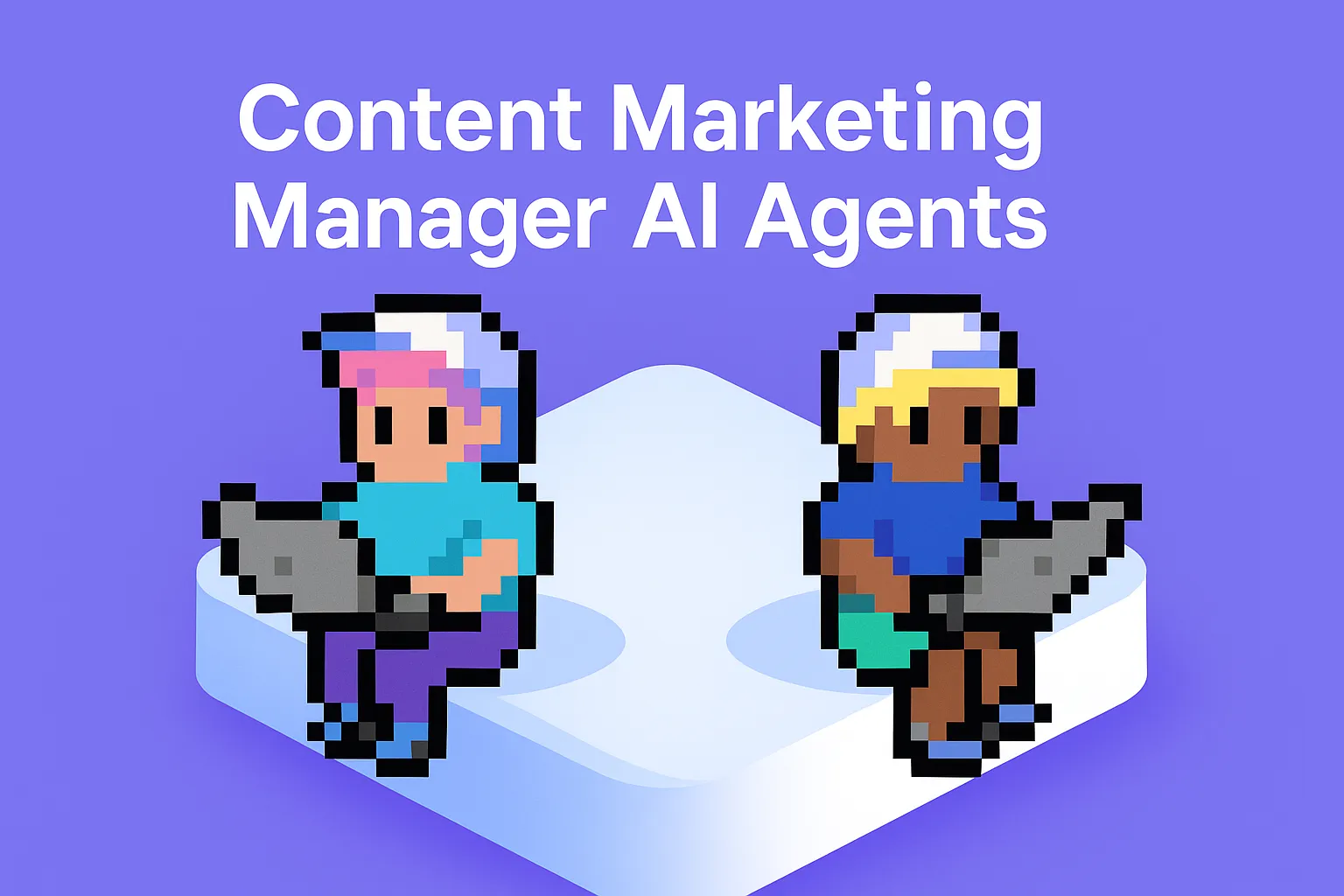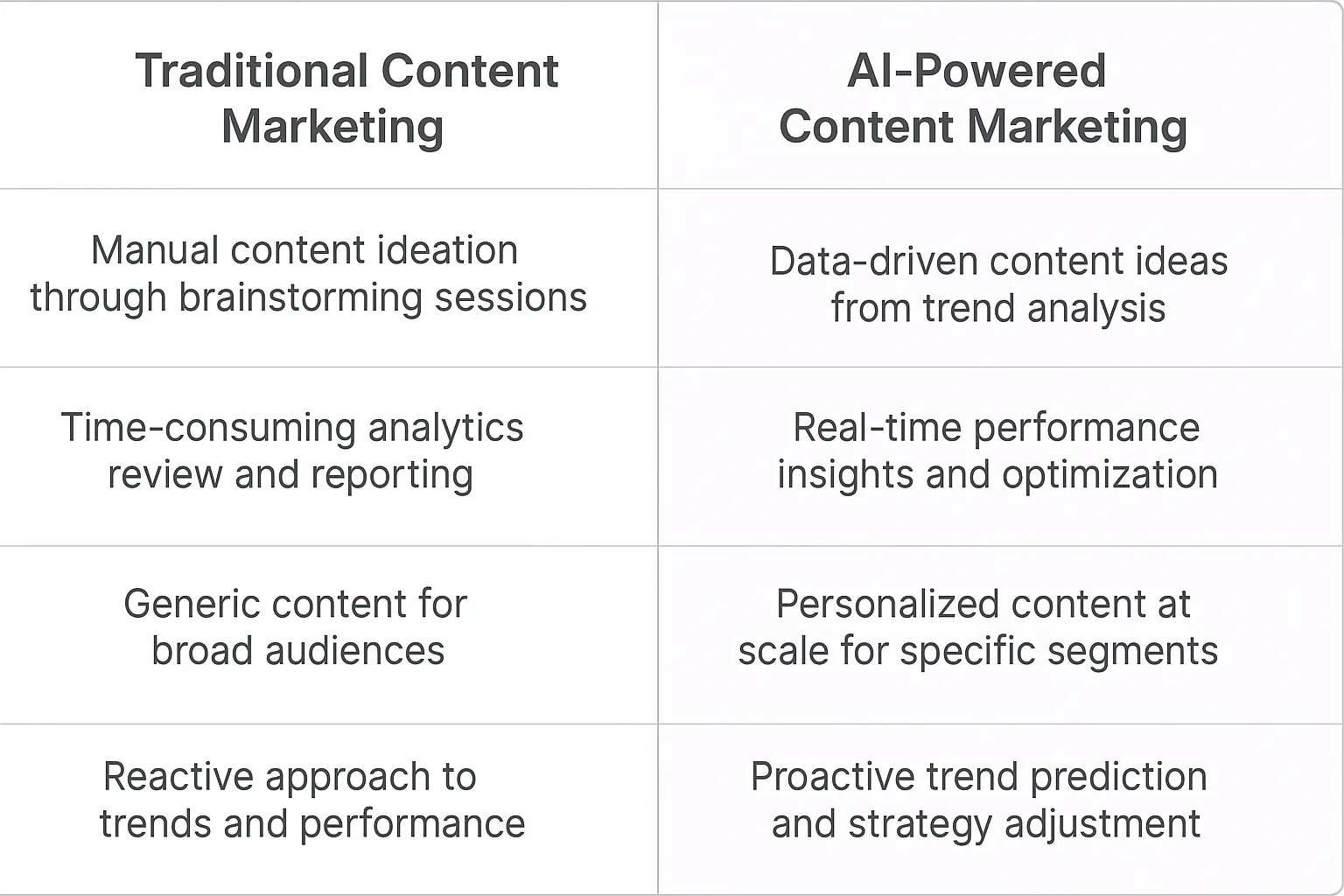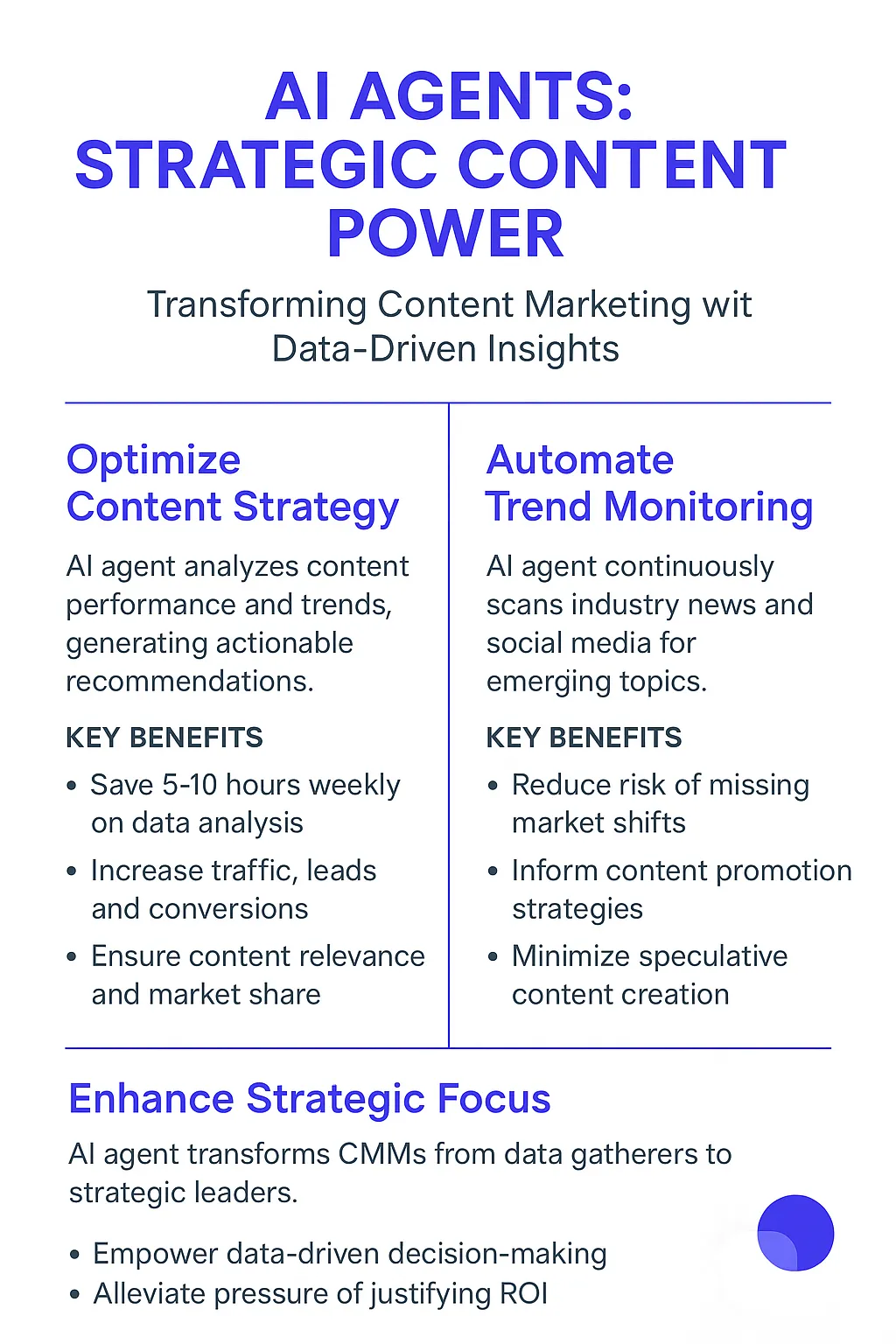Content Marketing Manager is a role that sits at the intersection of creativity and strategy. It's about crafting compelling narratives that resonate with target audiences while driving business objectives. These professionals orchestrate the creation, distribution, and measurement of content across various channels, aiming to build brand awareness, engage customers, and ultimately drive conversions.
The role of a Content Marketing Manager is multifaceted, encompassing several key features:1. Strategy Development: Crafting comprehensive content strategies aligned with business goals.2. Content Creation: Overseeing the production of diverse content types, from blog posts to videos.3. Distribution Management: Ensuring content reaches the right audience through appropriate channels.4. Performance Analysis: Measuring content effectiveness and ROI using analytics tools.5. Team Leadership: Managing writers, designers, and other content creators.6. Brand Voice Maintenance: Ensuring all content aligns with the brand's tone and messaging.7. Trend Monitoring: Staying ahead of industry trends and audience preferences.8. Stakeholder Communication: Liaising with other departments to align content with overall marketing efforts.

Before AI agents entered the content marketing scene, managers relied on a hodgepodge of tools and manual processes. They'd juggle spreadsheets, content calendars, and project management software while frantically coordinating with writers, designers, and stakeholders. It was like trying to conduct an orchestra where half the musicians are playing different songs and the other half haven't shown up yet.
Content ideation often meant brainstorming sessions that felt more like pulling teeth. Analytics? That meant spending hours diving into data, trying to extract meaningful insights from a sea of numbers. And don't even get me started on the constant back-and-forth of content revisions and approvals. It was a time-consuming, often frustrating process that left many content marketing managers feeling like they were always playing catch-up.
Enter AI agents, the digital teammates that are transforming the content marketing landscape. These aren't just tools; they're collaborators that bring a new level of intelligence and efficiency to the table.
First off, AI agents are game-changers when it comes to content ideation. They can analyze vast amounts of data, spot emerging trends, and generate content ideas that are not only relevant but also likely to resonate with your target audience. It's like having a creative genius on your team who never sleeps and always has their finger on the pulse of your industry.
But the benefits don't stop there. AI agents can help optimize your content strategy by predicting which pieces are likely to perform well, suggesting the best times to publish, and even recommending personalized content for different audience segments. This level of precision targeting was previously unthinkable without an army of data analysts.
One of the most significant advantages is the time savings. AI agents can handle routine tasks like scheduling posts, formatting content, and even generating first drafts. This frees up content marketing managers to focus on high-level strategy and creative direction – you know, the stuff that actually moves the needle.
And let's talk about analytics. AI agents can crunch numbers faster than you can say "engagement rate," providing real-time insights and actionable recommendations. They can identify patterns and correlations that humans might miss, helping you continuously refine and improve your content strategy.
Perhaps most importantly, AI agents are learning machines. They get smarter over time, adapting to your brand voice, understanding your audience preferences, and becoming increasingly valuable members of your content marketing team.
The integration of AI agents into content marketing isn't just an incremental improvement – it's a paradigm shift. It's the difference between driving a car and piloting a spacecraft. Sure, they both get you from A to B, but one of them opens up entirely new possibilities and destinations. For content marketing managers willing to embrace this technology, the sky's the limit.

Content marketing managers are constantly juggling multiple balls in the air. They're orchestrating content creation, distribution, and analysis across various channels. AI agents can step in as digital teammates, taking on some of the heavy lifting and allowing content managers to focus on high-level strategy and creativity.
One key process AI agents can enhance is content ideation. By analyzing trending topics, competitor content, and audience engagement data, these digital teammates can generate fresh content ideas that resonate with the target audience. This isn't about replacing human creativity, but augmenting it with data-driven insights.
Another critical process is content optimization. AI agents can analyze existing content performance, identify gaps in the content strategy, and suggest improvements. They can even help with A/B testing headlines, meta descriptions, and call-to-actions, continuously learning and refining based on real-time performance data.
On a more granular level, AI agents can tackle specific tasks that often eat up a content marketing manager's time. For instance, they can draft social media posts based on longer-form content, ensuring consistent messaging across platforms while adapting to each channel's unique requirements.
Content research is another area where AI agents shine. They can quickly compile relevant statistics, case studies, and industry trends, providing content creators with a solid foundation for their pieces. This not only saves time but also ensures that content is well-informed and up-to-date.
AI agents can also assist with content editing and proofreading. While they shouldn't replace human editors entirely, they can catch basic grammatical errors, suggest improvements for readability, and even flag potential issues with tone or brand consistency.
Finally, these digital teammates can help with content performance analysis. They can crunch numbers from various analytics platforms, identify patterns, and generate insights that inform future content strategies. This allows content marketing managers to make data-driven decisions without getting bogged down in spreadsheets.
Let's talk about the cold, hard truth of content marketing: it's a game of diminishing returns. As more businesses pump out content, the bar for standing out keeps rising. It's like the Red Queen's race from Alice in Wonderland - you have to run faster and faster just to stay in the same place.
This is where AI agents come in. They're not just tools; they're growth multipliers. Think about it: what if you could clone your best content marketer, give them superhuman research abilities, and have them work 24/7? That's essentially what these AI agents offer.
But here's the kicker: the real value isn't in automating tasks. It's in unlocking new possibilities. AI agents can help you scale personalization to a degree that was previously impossible. Imagine creating thousands of content variations, each tailored to specific user segments, and continuously optimizing based on real-time engagement data. That's the kind of growth hack that can give you an exponential advantage.
However, there's a catch. As AI agents become more prevalent, they'll raise the baseline for content quality and quantity. The businesses that will win aren't those that simply adopt AI, but those that figure out how to use AI in unique, creative ways that align with their brand and audience.
In the end, AI agents won't replace content marketing managers. They'll elevate them. The most successful content marketers of the future will be those who can effectively collaborate with AI, using it to amplify their creativity and strategic thinking. It's not about man vs. machine; it's about man and machine vs. the competition.

AI agents are reshaping the content marketing landscape, offering capabilities that go far beyond simple automation. These digital teammates are becoming indispensable for content marketing managers across various sectors. Let's dive into some concrete, industry-specific scenarios where AI agents are making a significant impact on content creation and distribution strategies.
From e-commerce to B2B tech, AI agents are helping content marketing managers craft more engaging narratives, optimize content for search engines, and personalize messaging at scale. They're not just tools; they're becoming integral parts of content teams, augmenting human creativity and strategic thinking in ways that were once thought impossible.
The following use cases illustrate how AI agents are transforming content marketing workflows, enhancing productivity, and driving better results across different industries. These examples showcase the practical applications of AI in content marketing, demonstrating how these digital teammates are becoming essential for staying competitive in today's content-driven digital landscape.
The e-commerce landscape is a content battlefield. Every brand is vying for attention, trying to cut through the noise. Enter the Content Marketing Manager AI Agent – a game-changer for online retailers.
Take Zara, the fast-fashion giant. They're constantly dropping new collections, but their content game hasn't kept pace. A Content Marketing Manager AI could revolutionize their approach. It would analyze trending topics, customer behavior, and search patterns in real-time, crafting content strategies that resonate with their fashion-forward audience.
This AI doesn't just churn out generic blog posts. It's a strategic powerhouse. It could identify micro-trends within Zara's target demographics, suggesting content themes that align with emerging styles before they hit the mainstream. Imagine content that predicts the next big thing in streetwear, backed by data-driven insights.
The AI would optimize content distribution too. It'd know exactly when Zara's audience is most receptive to different content types – whether it's a behind-the-scenes Instagram story of a photoshoot or an in-depth sustainability report on their website.
But here's where it gets really interesting. The AI could personalize content at scale. It'd analyze individual customer preferences and browsing history, tailoring product recommendations and style guides for each user. This level of personalization was previously impossible at Zara's scale.
The result? A content strategy that's always on-trend, deeply personalized, and measurably effective. Zara could see higher engagement rates, increased time-on-site, and ultimately, a boost in conversions. This isn't just content marketing – it's precision-guided fashion communication.
Let's talk about how a Content Marketing Manager AI Agent could transform the travel industry, specifically for a platform like Airbnb. This isn't just about pumping out more blog posts about "10 hidden gems in Paris." It's about creating a content ecosystem that's as dynamic and personalized as travel itself.
Airbnb's content challenge is unique. They're not just selling rooms; they're selling experiences in every corner of the globe. A Content Marketing Manager AI could tap into this vast network of hosts, guests, and locations to create a content strategy that's truly global yet intimately local.
Here's where it gets interesting. The AI could analyze millions of guest reviews, host descriptions, and local event calendars in real-time. It would identify emerging travel trends before they hit the mainstream. Maybe there's a sudden spike in interest for eco-lodges in Costa Rica, or a new food scene bubbling up in a Bangkok neighborhood. The AI would flag these trends and generate content ideas that put Airbnb ahead of the curve.
But it's not just about predicting trends. This AI would be a master of personalization. It could create dynamic content paths for each user based on their past trips, wishlist items, and browsing behavior. A backpacker from Berlin and a family from Florida would see entirely different content tailored to their travel styles and aspirations.
The AI wouldn't stop at written content. It could suggest video concepts, podcast topics, and even AR experiences that showcase properties and destinations in innovative ways. Imagine an AI-generated AR tour of a treehouse in Brazil, narrated in the user's native language, highlighting the exact features they care about most.
Here's the kicker: this AI would be a conversion machine. It would continuously A/B test content formats, headlines, and calls-to-action, optimizing for bookings in real-time. It could even adjust content based on factors like weather at the user's location or major events happening in their area.
The result? A content strategy that feels less like marketing and more like a personalized travel companion. Users would spend more time exploring, dreaming, and ultimately, booking. Airbnb could see higher engagement, increased booking rates, and a stronger emotional connection with their brand.
This isn't just about making content. It's about using AI to turn content into a core part of the product experience. In the competitive world of travel, that's the kind of edge that creates category leaders.
Implementing a Content Marketing Manager AI Agent isn't just about plugging in some fancy algorithm and watching the magic happen. It's a complex dance of data, algorithms, and human expertise. One of the biggest technical hurdles is teaching the AI to understand context and nuance in language. We're not just talking about grammar here – we're talking about the subtle differences between industries, target audiences, and brand voices.
Another technical challenge is integrating the AI with existing content management systems and marketing tools. It's like trying to fit a square peg into a round hole sometimes. The AI needs to play nice with your CMS, your analytics platforms, and your distribution channels. And let's not forget about data privacy and security. With great power comes great responsibility, and these AI agents are handling some pretty sensitive information.
On the operational side, the biggest challenge is often the human element. Introducing an AI Content Marketing Manager can feel like bringing in a new team member – one that works at superhuman speed and never sleeps. This can be intimidating for existing team members. There's a real risk of resistance or even resentment if the implementation isn't handled carefully.
Another operational challenge is maintaining the quality and consistency of output. While AI can produce content at scale, it still needs human oversight to ensure it aligns with brand standards and strategic goals. It's not about replacing human creativity, but augmenting it. Finding the right balance between AI-generated content and human-crafted pieces is crucial.
Lastly, there's the challenge of continuous learning and improvement. AI doesn't just set it and forget it. It needs ongoing training and fine-tuning based on performance data and changing market conditions. This requires a dedicated team and resources, which can be a significant operational commitment.
The integration of AI agents into content marketing isn't just a trend - it's a seismic shift in how we approach content creation and distribution. These digital teammates are redefining what's possible in content marketing, offering levels of personalization, efficiency, and insight that were previously unattainable.But here's the real kicker: AI agents aren't replacing content marketing managers. They're supercharging them. The most successful marketers will be those who can effectively collaborate with AI, using it to amplify their creativity and strategic thinking.As we move forward, the businesses that thrive won't just be those that adopt AI, but those that find innovative ways to leverage it. They'll use AI to create content experiences that are more personalized, more engaging, and more impactful than ever before.The future of content marketing is here, and it's powered by AI. Are you ready to level up?